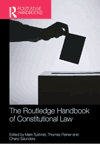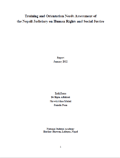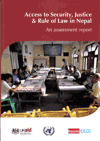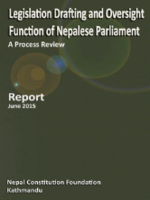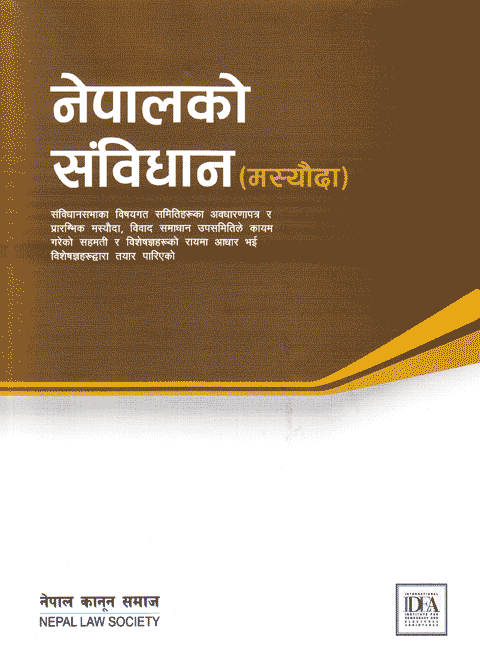Chapter on Cultural and Language Rights
By Bipin Adhikari & Carlos Viver
in “The Routledge Handbook of Constitutional Law”
(Routledge: 2012)
The Routledge Handbook of Constitutional Law is an advanced level reference work which surveys the current state of constitutional law. Featuring new, specially commissioned papers by a range of leading scholars from around the world, it offers a comprehensive overview of the field as well as identifying promising paths for future research. The book presents the key issues in constitutional law thematically allowing for a truly comparative approach to the subject. It also pays particular attention to constitutional design, identifying and evaluating various solutions to the issues which are involved in the design of constitutions. Bipin Adhikari joins Carles Viver in writing a cahpter on the book on Landuage and culture.
The book is split into four parts for ease of reference:
• Part One: General issues – sets issues of constitutional law firmly in context including topics such as the making of constitutions, the impact of religion and culture on constitutions, and the relationship between international law and domestic constitutions.
• Part Two: Structures – presents different approaches in regard to institutions or state organization and structural concepts such as emergency powers and electoral systems
• Part Three: Rights – covers the key rights often enshrined in constitutions
• Part Four: New Challenges – explores issues of importance such as migration and refugees, sovereignty under pressure from globalization, Supranational Organizations and their role in creating post-conflict constitutions, and new technological challenges.
Providing up-to-date and authoritative articles covering all key aspects of constitutional law, this reference work is essential reading for advanced students, scholars and practitioners in the field.
Table of Contents
Part 1: General issues
1. Constitutions and constitutionalism, Olivier Beaud and Yasuo Hasebe
2. Constitutions embedded in different legal systems, Thomas Fleiner and Cheryl Saunders
3. International relations and international law, Anne Peters and Ulrich Preuss
4. Constitutions and legitimacy over time, Catherine Dupre and Jiunn-rong Yeh
5. National uniqueness and convergence/globalization, Zaid Al-Ali and Arun Thiruvengadam
6. Religion and Culture, Javier Couso and Rohan Edrinsha
7. Constitution making
8. Constitutional interpretation, Amnon Reichman and Dominique Rousseau
Part 2: Structures
9. Governmental systems, Denis Baranger and Christina Murray
10. Emergency powers, Victor Ramraj and Menaka Gurumswamy
11. The judiciary and constitutional review, Albert Chen and Luis Miguel Maduro
12. Administrative bureaucracies, Hector Fix-Fierro and Janet MacLean
13. Electoral systems, Babacar Kante and MP Singh
14. Federalism and autonomy, Lidija Basta-Fleiner and Jean Francois Gaudreault-Desbiens
15. Minorities, Solomon Dersso and Francesco Palermo
16. Free expression and association, Iain Currie Part 3: Rights
17. Freedom of and right to information, Thomas Bull and Hugh Corder
18. Freedom of religion and establishment or non-establishment, W. Cole Durham and Carolyn Evans
19. Human dignity, Margit Cohn and Dieter Grimm
20. Rights in connection with criminal process, Maximo Langer and Kent Roach
21. Procedural fairness, Sophie Boyron and Wendy Lacey
22. Limits on punishment, Denise Meyerson and Martin Scheinin
23. Rights of non-citizens, Linda Bosniak and Atsushi Kondo
24. General provisions dealing with equality, Ruth Rubio-Marin and Michal Stein
25. Gender equality, including rights of sexual minorities, Wen-Chen Chang
26. Race and ethnicity, Patrick Macklem and Adrien Wing
27. Positive discrimination/affirmative action with respect to gender and race, Robert Cottrol and Megan Davis
28. Social and economic rights, George Katrougalos
29. Property rights, Kirsty Gover and Jeremy Webber
30. “Third generation” rights, focusing on the distinction between individual and collective rights, Roberto Gargarella and Michael Karayanni
31. Cultural and language rights, Bipin Adhikari and Carlos Viver
32. Environmental rights, including rights of future generations, Han Sik Cho
33. State Action/Horizontal Effect, Colm O’Cinneide and Manfred Stelzer
34. Justiciability, Juani Bertomeu and Mark Tushnet
Part 4: New Challenges
35. Asylum and Refugees, Michelle Foster and Jonathan Klaaren
36. Sovereignty, Nihil Bhuta and Stefan Oeter
37. Multicultural Societies and Migration, Anna Gamper and Theo Ohlinger
38. Supranational Organizations, including peace enforcement and United Nations, Nicholas Haysom
39. New Technological Challenges, Anita Allen and Thomas Fetzer
About the Author
Mark Tushnet is the William Nelson Cromwell Professor of Law at Harvard Law School, USA. Thomas Fleiner is Professor for the general theory of state at the distant University of Brig, Switzerland. Cheryl Saunders is a laureate professor at the University of Melbourne Law School, Australia and holds a personal chair in law.
